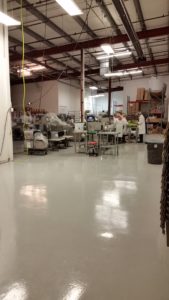The topic of enhanced cleaning and disinfecting is likely being discussed more now than possibly any other point in history. With confirmed cases of Covid-19, many schools closed for deep cleanings in the days before the remaining school year was relegated to home learning. Grocery stores and other essential businesses are enacting cleaning and safety protocols like we have never seen before. There is plenty of talk about hand washing and disinfecting high touch surfaces like doorknobs and gas pumps, but little is being said about another possible transmission source for pathogens and that is flooring.

The last several years have seen a major shift from traditional types of flooring to fluid applied floors in many places where bacterial growth and the spread of pathogens could be very detrimental, namely hospitals and commercial kitchens. Veterinary clinics, laboratories, food production facilities, and restrooms are also common spaces seeing this shift in flooring. Sectioned flooring like grouted tiles or vinyl can be attractive and durable, but the seams and grout lines can harbor germs leading to the spread of pathogens. Concrete floors have also become quite popular as of late due to their durability, but without a high quality sealer, the pores of the concrete can also foster bacteria growth.
Fluid applied floors like epoxies and urethane cements are poured in place and once cured, leave a solid surface that is easy to clean, doesn’t allow liquid to absorb, and won’t harbor germs. Many of these material also have anti-microbial additives to help germ and mold fighting efforts, not only across the surface of the floor, but throughout the entire coating material, so there is never any concern of a drop in performance as the surface wears over time.
Many hospitals, clinics and kitchens use harsh chemicals to fight the spread of bacteria. Over time, these chemicals can slowly degrade a floor surface. A fluid applied floor system can be designed to withstand these chemicals from the start thus preventing them from causing damage to the surface and reducing the life of the floor. Using chemicals to clean can be an important part of mitigating the spread of bacteria and viruses. Choosing the right flooring material will give you the longest life under the harsh conditions the cleaning chemicals present.
Regardless of the type of flooring in a facility, a proper cleaning and maintenance schedule is vital. Often floors can be neglected and with the abuse they can take from moving heavy equipment, extreme foot traffic, and wheeled traffic they can become damaged over time. Floors should regularly be inspected for cracks, peeling, and damaged areas so that they can promptly be fixed.
Preventing the spread of bacterial and viruses is vital for patient health in hospitals, but it can be just as important for employees in non-healthcare facilities particularly with the current Covid-19 pandemic. Choosing the right floor system for your facility’s particular needs, as well as implementing a regular cleaning and sanitizing schedule, can help reduce the risk of infection for patients and employees, but can also minimize the spread throughout the community as a whole.
If you would like more information about fluid applied flooring and anti-microbial options for your facility, feel free to contact us and in the meantime, stay safe.